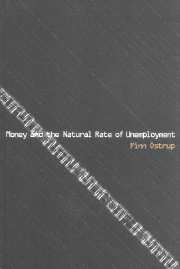Book contents
- Frontmatter
- Contents
- Preface
- Part I Introduction and main assumptions
- Part II The impact of monetary policy and inflation
- Part III The impact of monetary regimes
- 9 Centralised wage formation
- 10 Fiscal policy
- 11 Price stability goal
- 12 Uncertainty concerning policy formation
- 13 Policy uncertainty in a fixed-but-adjustable exchange rate regime
- 14 The impact of uncertainty on wage setting
- Part IV Policy implications
- Appendix: Microeconomic foundations
- Bibliography
- Index
12 - Uncertainty concerning policy formation
Published online by Cambridge University Press: 22 September 2009
- Frontmatter
- Contents
- Preface
- Part I Introduction and main assumptions
- Part II The impact of monetary policy and inflation
- Part III The impact of monetary regimes
- 9 Centralised wage formation
- 10 Fiscal policy
- 11 Price stability goal
- 12 Uncertainty concerning policy formation
- 13 Policy uncertainty in a fixed-but-adjustable exchange rate regime
- 14 The impact of uncertainty on wage setting
- Part IV Policy implications
- Appendix: Microeconomic foundations
- Bibliography
- Index
Summary
Introduction
This chapter analyses the determination of inflation and natural unemployment in a Barro–Gordon model setting, assuming that the authorities' policy reaction to a given nominal wage increase is not known with certainty by the wage setters and assuming that natural production is determined endogenously through the wage setters' optimisation with respect to employment and the real wage. It is further assumed that the uncertainty faced by the wage setters regarding the authorities' policy response depends on the rate of inflation, higher inflation causing a rise in uncertainty. This last assumption can be justified both on empirical grounds, the empirical evidence showing greater uncertainty with respect to inflation at higher levels, and on theoretical grounds, for example, due to stronger pressure on policy makers when inflation is high.
The analysis demonstrates that the authorities' policy preferences have an impact on the combinations of the real wage and employment which can be reached by the wage setters, and thus on natural production. This makes it impossible to argue, as in the analysis based on Kydland and Prescott (1977) and Barro and Gordon (1983a), that institutional reforms aimed at bringing about price stability, for example, the establishment of an independent central bank, reduce inflation at no cost in terms of higher unemployment. The analysis shows that the authorities, by abandoning the use of monetary policy to reach a production goal, lose the possibility of influencing natural unemployment.
- Type
- Chapter
- Information
- Money and the Natural Rate of Unemployment , pp. 212 - 224Publisher: Cambridge University PressPrint publication year: 2000



